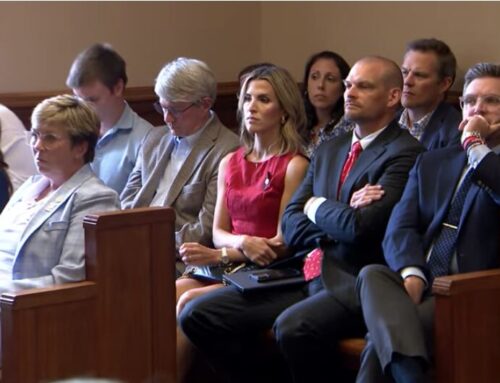TBI files can be secret even when entered as evidence, Criminal Appeals Court says
Last week, the Tennessee Court of Criminal Appeals ruled that Tennessee Bureau of Investigation files could remain confidential even when they are entered as evidence in a court trial.
The case in which this came up involved the heinous murder of Channon Christian, 21, and Christopher Newsom, 23, who were kidnapped, raped and tortured in Knoxville in 2007. The guilty verdicts in the trial were put in question when the presiding judge, Richard Baumgartner, became subject to a TBI probe related to buying prescription drug painkillers from two felons. Defense attorneys sought new trials, and parts of the TBI investigation were entered into the judicial proceeding.
The parents of the victims intervened, seeking access to the TBI files entered into the court.

Court of Criminal Appeals Judge Timothy Easter from the Middle Tennessee District wrote the opinion regarding TBI files.
From the Knoxville News Sentinel:
The Tennessee Court of Criminal Appeals ruled that Tennessee Bureau of Investigation files have been given special protection from the state Open Records Act — even when such a file is entered as an exhibit in judicial proceedings that do fall under the act.
It did so, the court acknowledged, without any case law attesting to the soundness of its decision.
TBI files have had an exemption in the Tennessee Public Records Act for years — it’s the second one listed under “Confidential Records – Exceptions.” Every few years, the Legislature adds more information to the exemption, such as last year when investigations and records from the Tennessee Alcoholic Beverage Commission were tagged on.
Only elected members of the Legislature can see the TBI files, or the information can be disclosed if ordered by a court or through subpoena.
You can find this exemption under T.C.A. 10-7-504:
(2) (A) All investigative records of the Tennessee bureau of investigation, the office of inspector general, all criminal investigative files of the department of agriculture and the department of environment and conservation, all criminal investigative files of the motor vehicle enforcement division of the department of safety relating to stolen vehicles or parts, all criminal investigative files and records of the Tennessee alcoholic beverage commission and all files of the handgun carry permit and driver license issuance divisions of the department of safety relating to bogus handgun carry permits and bogus driver licenses issued to undercover law enforcement agents shall be treated as confidential and shall not be open to inspection by members of the public. The information contained in such records shall be disclosed to the public only in compliance with a subpoena or an order of a court of record; provided, however, that such investigative records of the Tennessee bureau of investigation shall be open to inspection by elected members of the general assembly if such inspection is directed by a duly adopted resolution of either house or of a standing or joint committee of either house. Records shall not be available to any member of the executive branch except to the governor and to those directly involved in the investigation in the specified agencies.
The law goes on to explain how some of the records listed in the exemption become public once an investigation is over or a case is finished, such as records of the departments of agriculture and environment and conservation. There is nothing in the statute, however, that says TBI records eventually become public when investigations are over. That’s in contrast to investigations by local police and sheriff’s departments, whose investigations are public record when a case closes.
But it’s been long presumed under the U.S. Constitution that judicial proceedings are open, and all evidence entered in the proceeding is also open, unless expressly closed by a judge for some specific reason.
In an opinion concerning to open government advocates, the Court of Criminal Appeals essentially said that TBI files even when entered as an exhibit in a courtroom can remain confidential.
Judge Timothy Easter, who the governor appointed in August 2014 to fill a vacancy, wrote the opinion, and was joined by John Everett Williams and Robert Wedemeyer. An excerpt from Easter’s opinion:
Yet, as discussed above, the statutory right of access to judicial records under the PRA is not absolute. We do not believe that the general requirement of disclosure was intended to trump the TBI file’s specific confidential designation by the General Assembly….Although we could not find any cases resolving the conflict between a confidentiality exemption under Section 10-7-504(a)(2)(A) and the general disclosure mandate for judicial records, we conclude that the legislature intended for the more specific statutory exemption to prevail as a source of contrary state law.
The Knoxville News-Sentinel, in its report last week on the opinion, noted the newspaper is also seeking access to parts of the TBI records entered in a different court:
The News Sentinel also lost a bid to gain access to the file in state court. However, the newspaper is seeking a copy from U.S. District Court, where it was entered without seal in Baumgartner’s trial on charges he lied to cover for his pill-supplying mistress. The newspaper requested the file in July 2013. U.S. Magistrate Judge Clifford Shirley has yet to rule.




